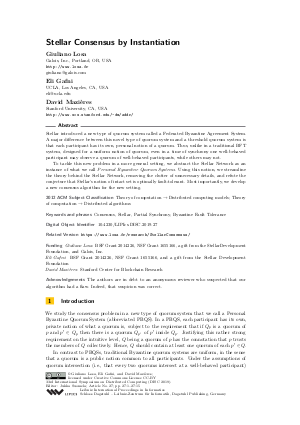Stellar Consensus by Instantiation
Authors Giuliano Losa, Eli Gafni, David Mazières
-
Part of:
Volume:
33rd International Symposium on Distributed Computing (DISC 2019)
Part of: Series: Leibniz International Proceedings in Informatics (LIPIcs)
Part of: Conference: International Symposium on Distributed Computing (DISC) - License:
 Creative Commons Attribution 3.0 Unported license
Creative Commons Attribution 3.0 Unported license
- Publication Date: 2019-10-08
File

PDF
LIPIcs.DISC.2019.27.pdf
- Filesize: 456 kB
- 15 pages
Document Identifiers
Related Versions
Subject Classification
ACM Subject Classification
- Theory of computation → Distributed computing models
- Theory of computation → Distributed algorithms
Keywords
- Consensus
- Stellar
- Partial Synchrony
- Byzantine Fault Tolerance
Metrics
- Access Statistics
-
Total Accesses (updated on a weekly basis)
0Document
0Metadata
Abstract
Stellar introduced a new type of quorum system called a Federated Byzantine Agreement System. A major difference between this novel type of quorum system and a threshold quorum system is that each participant has its own, personal notion of a quorum. Thus, unlike in a traditional BFT system, designed for a uniform notion of quorum, even in a time of synchrony one well-behaved participant may observe a quorum of well-behaved participants, while others may not. To tackle this new problem in a more general setting, we abstract the Stellar Network as an instance of what we call Personal Byzantine Quorum Systems. Using this notion, we streamline the theory behind the Stellar Network, removing the clutter of unnecessary details, and refute the conjecture that Stellar’s notion of intact set is optimally fault-tolerant. Most importantly, we develop a new consensus algorithm for the new setting.
Cite As Get BibTex
Giuliano Losa, Eli Gafni, and David Mazières. Stellar Consensus by Instantiation. In 33rd International Symposium on Distributed Computing (DISC 2019). Leibniz International Proceedings in Informatics (LIPIcs), Volume 146, pp. 27:1-27:15, Schloss Dagstuhl – Leibniz-Zentrum für Informatik (2019)
https://doi.org/10.4230/LIPIcs.DISC.2019.27
BibTex
@InProceedings{losa_et_al:LIPIcs.DISC.2019.27,
author = {Losa, Giuliano and Gafni, Eli and Mazi\`{e}res, David},
title = {{Stellar Consensus by Instantiation}},
booktitle = {33rd International Symposium on Distributed Computing (DISC 2019)},
pages = {27:1--27:15},
series = {Leibniz International Proceedings in Informatics (LIPIcs)},
ISBN = {978-3-95977-126-9},
ISSN = {1868-8969},
year = {2019},
volume = {146},
editor = {Suomela, Jukka},
publisher = {Schloss Dagstuhl -- Leibniz-Zentrum f{\"u}r Informatik},
address = {Dagstuhl, Germany},
URL = {https://drops.dagstuhl.de/entities/document/10.4230/LIPIcs.DISC.2019.27},
URN = {urn:nbn:de:0030-drops-113343},
doi = {10.4230/LIPIcs.DISC.2019.27},
annote = {Keywords: Consensus, Stellar, Partial Synchrony, Byzantine Fault Tolerance}
}
Author Details
Funding
- Losa, Giuliano: BSF Grant 2014226, NSF Grant 1655166, a gift from the StellarDevelopment Foundation, and Galois, Inc.
- Gafni, Eli: BSF Grant 2014226, NSF Grant 1655166, and a gift from the Stellar Development Foundation
- Mazières, David: Stanford Center for Blockchain Research
Acknowledgements
The authors are in debt to an anonymous reviewer who suspected that our algorithm had a flaw. Indeed, that suspicion was correct.
References
- Ittai Abraham, Guy Gueta, Dahlia Malkhi, and Jean-Philippe Martin. Revisiting fast practical byzantine fault tolerance: Thelma, Velma, and Zelma. arXiv preprint, 2018. URL: http://arxiv.org/abs/1801.10022.
-
James Aspnes. A modular approach to shared-memory consensus, with applications to the probabilistic-write model. Distributed Computing, 25(2):179-188, 2012.

-
Miguel Castro and Barbara Liskov. Practical Byzantine fault tolerance and proactive recovery. ACM Transactions on Computer Systems (TOCS), 20(4):398-461, 2002.

- Brad Chase and Ethan MacBrough. Analysis of the XRP Ledger consensus protocol. arXiv preprint, 2018. URL: http://arxiv.org/abs/1802.07242.
-
Allen Clement, Edmund L Wong, Lorenzo Alvisi, Michael Dahlin, and Mirco Marchetti. Making Byzantine Fault Tolerant Systems Tolerate Byzantine Faults. In NSDI, volume 9, pages 153-168, 2009.

-
Cynthia Dwork, Nancy Lynch, and Larry Stockmeyer. Consensus in the presence of partial synchrony. Journal of the ACM (JACM), 35(2):288-323, 1988.

-
Álvaro García-Pérez and Alexey Gotsman. Federated Byzantine Quorum Systems. In 22nd International Conference on Principles of Distributed Systems (OPODIS 2018). Schloss Dagstuhl-Leibniz-Zentrum fuer Informatik, 2018.

-
Rachid Guerraoui, Nikola Knežević, Vivien Quéma, and Marko Vukolić. The next 700 BFT protocols. In Proceedings of the 5th European conference on Computer systems, pages 363-376. ACM, 2010.

-
Rachid Guerraoui and Marko Vukolić. Refined quorum systems. Distributed Computing, 23(1):1-42, 2010.

-
Martin Hirt and Ueli Maurer. Complete characterization of adversaries tolerable in secure multi-party computation. In PODC, volume 97, pages 25-34, 1997.

-
Ramakrishna Kotla, Lorenzo Alvisi, Mike Dahlin, Allen Clement, and Edmund Wong. Zyzzyva: Speculative Byzantine Fault Tolerance. In Proceedings of Twenty-first ACM SIGOPS Symposium on Operating Systems Principles, SOSP '07, pages 45-58, New York, NY, USA, 2007. ACM.

- Giuliano Losa. Stellar Quorum Systems. Archive of Formal Proofs, August 2019. , Formal proof development. URL: http://isa-afp.org/entries/Stellar_Quorums.html.
-
Dahlia Malkhi and Michael Reiter. Byzantine quorum systems. Distributed computing, 11(4):203-213, 1998.

-
David Mazieres. The Stellar Consensus Protocol: A federated model for internet-level consensus. Stellar Development Foundation, page 32, 2015.

- David Schwartz, Noah Youngs, and Arthur Britto. The Ripple Protocol Consensus Algorithm, 2014. URL: https://ripple.com/files/ripple_consensus_whitepaper.pdf.
